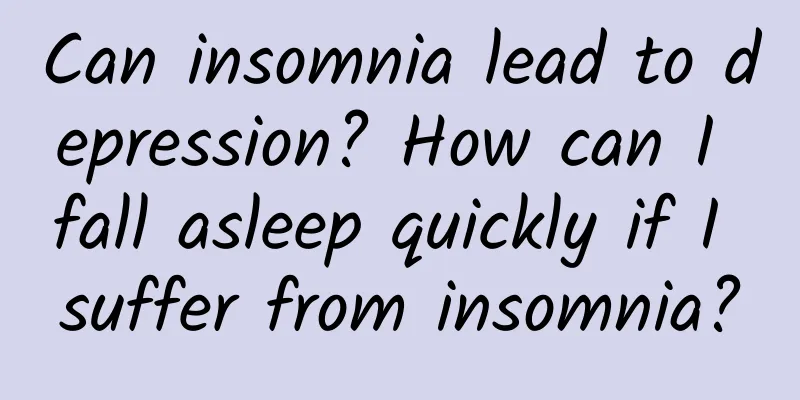Can insomnia lead to depression? How can I fall asleep quickly if I suffer from insomnia?

|
Insomnia is a problem that many people have, especially when they have work and study the next day. Not being able to sleep at night can make people very irritable. If you suffer from insomnia for a long time, it will make you feel mentally and physically uncomfortable, and you will feel depressed. So can insomnia lead to depression? How to fall asleep quickly? Can Insomnia Cause Depression?Insomnia and depression often coexist. 85% of patients with depression will suffer from insomnia, and people with insomnia are three times more likely to suffer from depression. Long-term chronic insomnia is indeed related to depression. Studies have found that the longer the insomnia lasts and the more severe the insomnia is, the more likely it is to develop into depression. How to fall asleep quickly when suffering from insomnia1. First, lie flat, put your left hand on your stomach, and raise your right hand above your head. 2. Relax your face and don't bring your eyes together (just like don't frown) because if you bring your eyes together, your mind will be very active, which is not conducive to sleep. At this time, roll your eyes up slightly, maybe like rolling your eyes. 3. The most important step: counting. Specific steps: When you inhale or exhale, count silently from the beginning to ten, and then start again from the beginning after counting to ten. Remember to count one number for each exhalation (or one number for each inhalation). At first you will consciously repeat the cycle, and then you will be surprised to find that you have unconsciously counted too much. It's okay, this is a sign that you will relax and go to sleep. Start from the beginning again, repeat, and slowly you will fall asleep. The impact of insomnia on the body1. Nervous system: Sleep promotes the connection of our nerve cells, which helps our learning and memory. Long-term insomnia can lead to a decline in learning ability and memory, difficulty concentrating, poor coordination, decreased reaction, and a high risk of accidents. It can also affect mood, irritability, depression, and even mental symptoms such as hallucinations. 2. Immune system: When we sleep, the immune system will "fight" against some foreign substances that enter our body, such as viruses, to protect our body. If we suffer from long-term insomnia, the immune system cannot "fight" effectively, and our body is more susceptible to infection by bacteria, viruses, etc. 3. Digestive system: Insomnia leads to decreased leptin secretion and increased obesity; 4. Increased risk of physical diseases: such as diabetes, heart disease, hypertension, asthma, inflammation, stroke, epilepsy, etc.; 5. Increased risk of mental illness: anxiety, depression, suicidal ideation, etc. |
Recommend
The first time I made love, there was only a little blood
Some women only have a small amount of blood in t...
"Stones" growing in the gallbladder
1. Is bile secreted by the gallbladder? Many peop...
The role of female urine
For women, it is important to understand the chan...
How to solve facial peeling during pregnancy?
Many pregnant mothers will experience dry skin du...
Can I eat chocolate after it melts and solidifies? How to store chocolate in summer
In summer, the surface temperature is too high. T...
When does breast tenderness disappear after pregnancy?
Some pregnant women may experience breast pain in...
Nine out of ten men have leakage, according to an old Chinese doctor
There is a folk saying that nine out of ten boys ...
Women are more likely to get pregnant during those days
Infertility is a very common thing nowadays. The ...
The more you rest, the more your waist hurts. Beware of "spondyloarthritis"
Long-term low back pain, and the longer you stay ...
Can I fill my teeth during my menstrual period?
There are many things that women need to pay atte...
A complete guide to diabetes: preventable and treatable, protecting your "sweet" life
Author: He Xin, Department of Endocrinology, Xi&#...
Women's easy pregnancy posture
Young people nowadays are under a lot of pressure...
What if a woman has no uterus?
Women do not have a uterus and therefore have no ...
Daily snacking, even small amounts, can reshape your brain
Friends often ask me, if I only eat a little swee...









